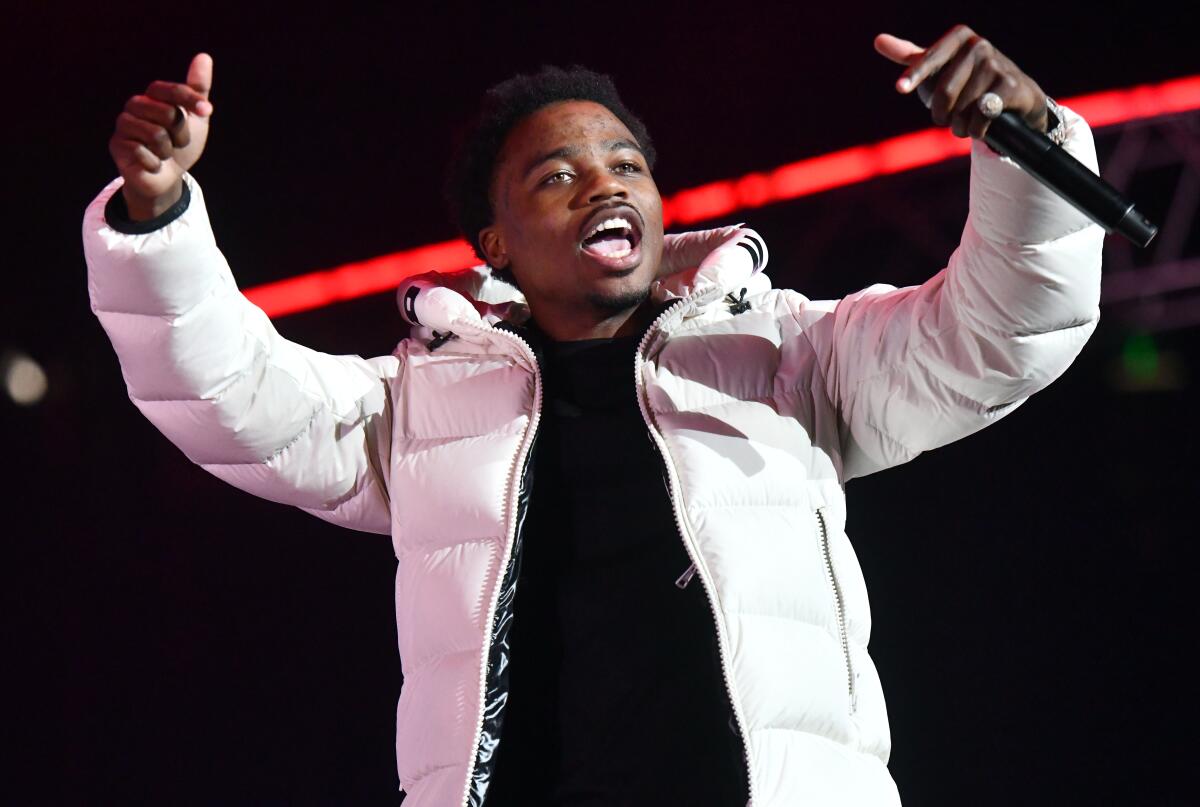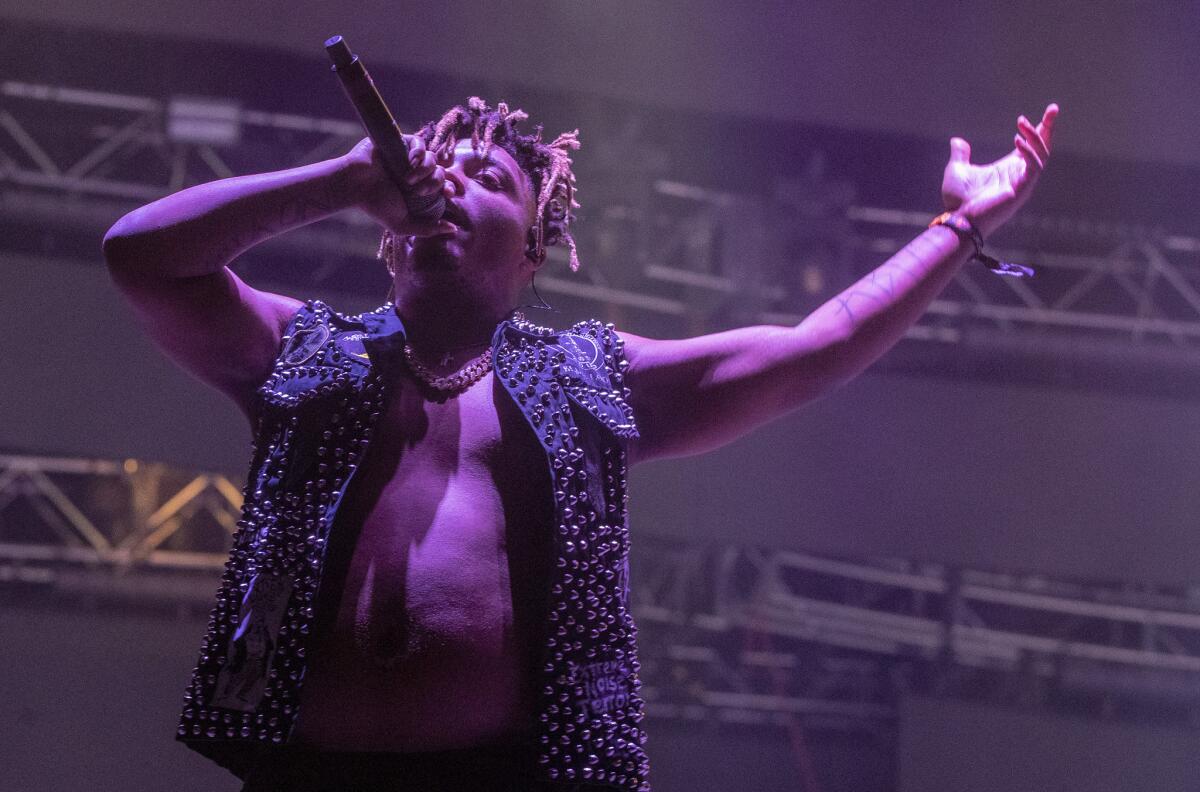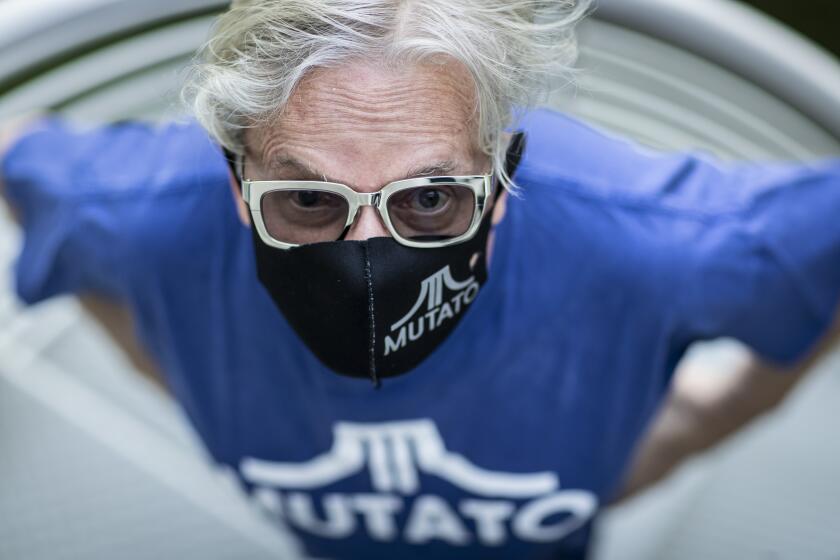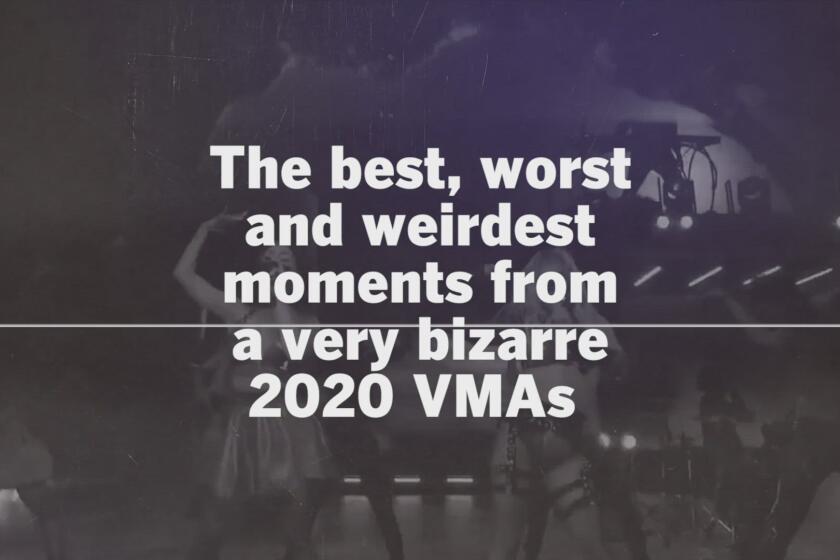Taylor & Megan & Harry & COVID? In music biz, it’s officially Grammy season
- Share via
Let the politicking begin.
With this week’s closing of the eligibility period for the 63rd annual Grammy Awards, the music industry is turning its attention to who will make the cut when nominations are announced for the ceremony meant to recognize albums and songs released between Sept. 1, 2019, and Aug. 31, 2020.
As always, the competition involves a mix of familiar superstars (including Taylor Swift and the Weeknd) and impressive upstarts (such as Roddy Ricch and Megan the Stallion); as always, record labels and other stakeholders are jockeying to position their acts in the eyes of Recording Academy members, who are set to start first-round voting on Sept. 30.
Yet the 63rd Grammys — scheduled to be held Jan. 31 in a manner to be determined — are being shaped in specific ways by the COVID-19 pandemic, which has upended the music business, and by a once-in-a-generation protest movement that’s brought new scrutiny to how the industry handles race.
There’s also a historic presidential election whose result is sure to frame this year’s nominations. (The academy hasn’t said when it will reveal the nods, though last year’s announcement came on Nov. 20.)
Indeed, as with the election, some have voiced concerns about the integrity of the Grammy process after former academy CEO Deborah Dugan, who was fired in March, claimed that voting was rigged by a secretive committee of favor-trading insiders. In June, the academy said it was instituting new guidelines requiring potential committee members to disclose any conflicts of interest they might have with artists vying for nominations — and that anyone caught concealing such a conflict would be barred from participating in the future.
“Our goal is to be as transparent as possible,” Dugan’s replacement, interim CEO Harvey Mason Jr., said recently.
Devo cofounder Mark Mothersbaugh spent weeks in Cedars-Sinai hospital, hooked up to a ventilator, his mind wracked by violent hallucinations.
Privately, though, people in the music business say they’re skeptical that the academy can do much to protect against entrenched alliances and resentments.
“Harvey’s done a good job trying to understand the problem,” said one veteran music-industry figure who asked anonymity to speak freely. “But I’m not sure what he’s done with the information.”
Mason, a songwriter and producer known for his work with Jennifer Hudson and Whitney Houston, has been more widely applauded for his efforts to diversify the academy’s membership. In July, officials invited more than 2,300 musicians, technicians and executives — half of them women and nearly 40% non-white — to join an organization long criticized as a bastion of old-white-guy values.
And Thursday the academy announced the formation of what it’s calling its Black Music Collective, with leaders including John Legend, Quincy Jones and Epic Records CEO Sylvia Rhone dedicated to “amplifying Black voices within the academy” and to “identify[ing] ways to drive more representation,” according to a statement.
Still, the upcoming nominations will be the real test of the academy’s diversity initiatives, said another seasoned executive who requested anonymity. With a laugh, this person added that they’d take a strong showing for “WAP” — Cardi B and Megan Thee Stallion’s exuberantly raunchy rap smash — as indication that the electorate is finally evolving.
In the Grammys’ major all-genre categories, “WAP” stands a good chance of being nominated for record of the year, which recognizes the performers and producers behind a single (as opposed to song of the year, which goes to songwriters). And it’s unlikely to be the only rap tune competing for that title: Expect to see nods for Ricch’s Hot 100-topping “The Box” — the Compton MC could also be nominated for his appearance on DaBaby’s “Rockstar” — and Megan’s remix of her “Savage” with a swaggering guest spot by Beyoncé.

Other leading record of the year contenders include the Weeknd’s synth-pop “Blinding Lights,” which last weekend won the MTV Video Music Award for video of the year; Doja Cat‘s shimmering retro-disco jam “Say So”; and “Watermelon Sugar” by Harry Styles, who may have grown up enough since his days with One Direction — and made enough of the right connections — to shake the academy’s longstanding prejudice against boy bands.
“There’s a lot of firepower behind Harry,” said one established producer, referring to the singer’s management by Jeffrey Azoff, son of the veteran manager Irving Azoff, and to high-profile endorsements by boomer icons like Stevie Nicks.
That prejudice will still work against BTS, the ultra-popular K-pop outfit. But the instant success of its “Dynamite,” which debuted this week at No. 1 with the biggest digital sales in nearly three years, could make a nod for record undeniable.
COVID-19 forced MTV’s Video Music Awards to blur the line between live, taped and in-between, but stars such as Lady Gaga and Miley Cyrus wowed regardless.
Styles and the Weeknd are likely to show up again in song of the year, where they may compete against Maren Morris’ sturdy country ballad “The Bones” and one of several tunes — “My Future,” “Everything I Wanted” or “No Time to Die,” from the latest James Bond film — by Billie Eilish, who took the big four prizes at the 62nd Grammys.
Album of the year will be watched closely for Swift’s possible return after her last two LPs, including 2019’s “Lover,” were passed over in the category she’s won twice. The rootsy “Folklore,” which the singer made in quarantine and released in July with only a day’s notice, earned enthusiastic reviews and is in its fifth week atop the Billboard 200 chart. And insiders say that Swift’s recent proclamations regarding President Trump and Black Lives Matter — a pronounced shift from the days when she steered clear of politics — have likely endeared her to voters in liberal showbiz enclaves.
Yet numerous academy members acknowledged privately that a win for Swift would present an optics problem at a moment defined by the fight for racial justice. What complicates that argument is that there’s no perfect vessel in album of the year — which is to say, there’s no album by Kendrick Lamar — for voters eager to anoint (and to be seen anointing) a superstar-level expression of protest.
Lil Baby, the Atlanta rapper whose woozy “My Turn” LP is a streaming goliath, has many thoughtful things to say about race in America. But he sounds nothing like Jay-Z or Eminem, to name two MCs more readily understood by aging members. And though the Weeknd has shown an activist’s streak by donating money to BLM and toward COVID-19 relief, his “After Hours” is a largely apolitical affair about poisoned romance.
Who else stands a chance in album of the year? Certainly the Chicks, longtime Grammy favorites back with “Gaslighter,” their first LP in 14 years, and possibly Fiona Apple, another returning fave whose “Fetch the Bolt Cutters” floored critics just as widespread stay-at-home orders went into place. (Then again, Apple’s jittery, percussion-heavy album may prove too weird for folks who preferred her more melodic early stuff: “It’s amazing, but I couldn’t listen to it more than once,” one voter admitted.)
In a year when fans of dance music had nowhere to dance, Lady Gaga and Dua Lipa made excellent club-inspired projects that balanced thudding beats and classic songcraft; expect one of them to score an album nod but not both. Also look out for Post Malone’s genre-blurring “Hollywood’s Bleeding”; “YHLQMDLG” by Latin pop’s most exciting young star, Bad Bunny; and Bob Dylan’s latest comeback effort, “Rough and Rowdy Ways.”
For best new artist, Megan Thee Stallion appears to be a sure thing, thanks in part to an academy rule change that did away with a previous limit on the number of tracks an act could have released to be considered a new artist. Doja Cat could benefit from the change as well.
“It has everything to do with the way we’re consuming music and artists are starting to break,” Mason said, “especially in hip-hop,” where a rapper might release dozens of tracks on streaming services before making an old-fashioned debut album.
Two other beloved hip-hop acts — Juice Wrld and Pop Smoke — may be nominated posthumously after the former died of a drug-related seizure in December and the latter was killed during a home invasion in the Hollywood Hills in February. Albums completed after their deaths have done enormous streaming business this year — so big, in fact, that Juice Wrld’s “Legends Never Die” and Pop Smoke’s “Shoot for the Stars, Aim for the Moon” (which also served as his debut) are long shots in the album category as well.

Whoever is nominated, experts agree that Grammy campaigning is likely to look different as a result of COVID — no concerts, no parties, no schmoozing after intimate Q&A sessions at downtown’s Grammy Museum. (The absence of shows this past spring and summer may also hurt the chances of a nomination for an album like the Highwomen’s self-titled debut, which came out in September but then fell quickly from view without a tour to help spur interest.)
And then there’s the Grammys ceremony itself, for which Mason said the academy is keeping its options open in terms of audience and whether performances are live or pre-recorded.
“I don’t want to speculate, but the full audience at Staples Center — seems like the percentage is going down on that happening,” he said.
After decades with Ken Ehrlich at the helm of the telecast, the 63rd Grammys will introduce a new executive producer in Ben Winston, best known for “The Late Late Show with James Corden” and for Corden’s viral “Carpool Karaoke” series.
Many in the industry are hopeful that Winston will bring fresh energy to the show, which under Ehrlich was often criticized in the same way the academy has been. But as one insider pointed out, Winston will still have the Grammys’ family-friendly broadcast partners at CBS to contend with.
“The academy could be like, ‘We want “WAP”!’” this person said. “And CBS will say, ‘Are you kidding? People in Arkansas will kill us.’”
More to Read
The biggest entertainment stories
Get our big stories about Hollywood, film, television, music, arts, culture and more right in your inbox as soon as they publish.
You may occasionally receive promotional content from the Los Angeles Times.













